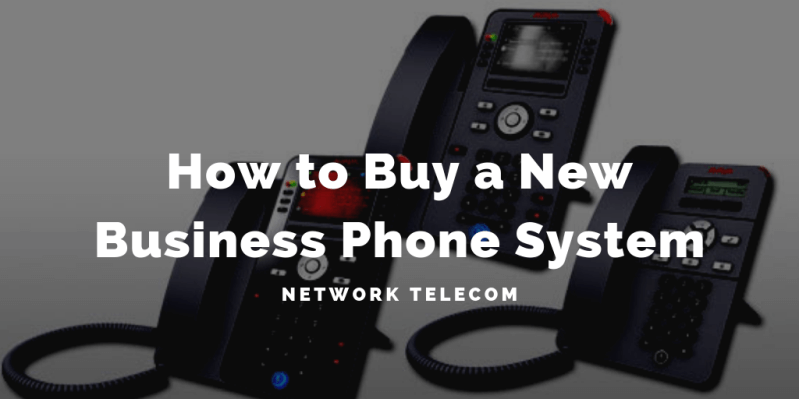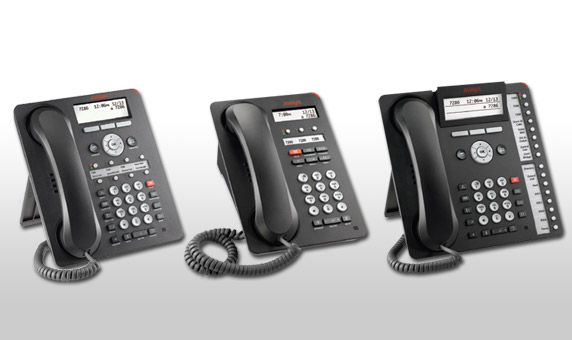Does your current business phone system need updating? Here’s a free guide that will help you choose the right system for your business. Purchase your business phone system now.

Steps to Buying a New Business Phone System
Step 1Know your customers and your business |
Step 2Determine what you need and create a budget |
Step 3Decide on your new business phone system |
Step 1: Know Your Customers and Your Business
Get to Know Your Users and Ask for Their Input
Most businesses have two types of phone users: internal and external. Before you choose a business phone system, it’s a good idea to talk to your users and find out what’s working and what isn’t with your current system.
Internal Users:
Your internal users include your staff members who work on-site and those who work remotely. Some are heavy phone users and others rarely use the phone. Each type of internal user will have a different perspective on the features and design that could help them be more efficient in their jobs.
Remote Workers – Take a look at how many remote workers you have and find out:
- If they prefer mobile devices or desktop phones
- If they have difficulty connecting with the home office
- If they need secure connections

Power Users – These are often your administrative staff and possibly your executives. Find out how many heavy ‘power users’ you have as well as:
- What specific functions they regularly use
- What additional features they would find helpful
- If they need more ergonomically friendly devices
- If they require headsets or other peripheral devices
Rare Users – These are your staff members who only need to use the phone system from time to time. Find out:
- If your rare users have difficulty using their current system and
- If they would benefit from a much simpler set-up
External Users:
Your external users include your customers, vendors, and business partners who use your system making inbound calls. It is a good idea to talk to your external users to find out what their experience is like with your current system. Do they find it easy to navigate and reach the people they need to? Do they ever get cut off, and would they prefer alternative ways to connect with you such as email or online?
Know Your Business and Take into Account Future Growth
When buying a new business phone system, you should not only take into account the number of employees you currently have, but also how many you think you will have in the coming years. Most businesses update their phone systems only every 10 years or so. Therefore, it is wise to take into account any future growth that you might experience and if the system you are considering will be able to accommodate it.

Take into account the number of employees you currently have, but also how many you think you will have in the future – Image Source: Avaya
Step 2: Determine What You Actually Need and Create a Budget
From your interviews with your users, you should have a good idea of what features they actually use and need. There are many great features available for office phone systems, but you may not need all of them. You also don’t want to be paying for ones that you don’t need and won’t use. Some of the features you might consider include:
- Programmable Speed Dials
- Multiple Voice Mail Boxes
- Automated Receptionist to Direct Calls
- Audio, Web and Video Conferencing
- Phone Sharing with Access Codes for Personalized Settings and Voicemail
- Digital Enhanced Cordless Telecommunications
Determine what features you need so you aren’t paying for ones you don’t use
Take a Look at What You Currently Have and How It Could Be Incorporated with a New Business Phone System
The type of network you have can affect what business phone system you choose. A traditional phone system uses a voice network, whereas a VoIP system runs on your Internet connection. If you have a traditional infrastructure in place, it might be more cost-effective to build on that. If you have a strong and fast data network, then switching to VoIP may be your better option. To determine what your network is like, it will help to do a technical inventory of all of the parts of your hardware and software. This includes:
- Servers: Check the CPU types and speed, RAM, etc. as well as the software versions.
- Personal Computers: Check how many you have and what hardware and software each use. Make a drawing of where each unit is located.
- Network Equipment: Check what switches, routers and internet connection hardware you have.
- Service Providers: List out your service providers and what services they provide, including Internet speeds and amount of bandwidth.
You will need a combination of servers, switches, and routers to set up your VoIP network
Determine Your Budget and Stick to It
Your budget will greatly affect the business phone system you choose. If your budget is limited, you may be able to find a provider who will let you phase in a new system over time instead of having to purchase it all new at one time. A hybrid solution could integrate parts of your old system with new components. Integration can also help you minimize downtime as it gradually introduces the new system instead of having to completely switch over to a new one.
Consider your total cost of ownership when pricing out your business phone system. Some systems may cost a lot more upfront but have low ongoing fees, while others have low set-up fees but may end up costing you more in the long run with higher monthly fees and expensive upgrades. A telecommunication provider you can trust can advise you on what your best option is.
Likewise, a cheaper system may not be your cheapest option over time. A lower quality system that has a negative customer impact and may not last as long could end up costing you more than a more expensive, higher quality system.
A more expensive, higher quality business phone system may have a lower total cost of ownership
Decide Whether to Lease or Buy
Leasing your system has the advantage that it can be replaced more often. If you want to always have the latest technology, then this might be a good option for you. However, when you lease, you don’t actually own your equipment.
Buying your business phone system means that you own it, so you have more control over it. You will also avoid interest payments and extra fees in the future. However, you probably won’t be updating it as often as if you leased your equipment.
Step 3: Decide on Your New Business Phone System
Now that you have a good idea of the type of business phone system you want, you are ready to choose the vendor and system that you want.
When you are selecting your vendor take a look at:
- Their ongoing support – do they offer same-day parts and 24/7/365 tech support?
- How much experience they have – how many years in the industry do they have?
- Their reputation – are they a local company that is well respected in the area? Get references from businesses like yours
- Find out about the warranties they offer.
- Choose a vendor that has a history of innovation so you know they are going to stay up-to-date.

Choose a trusted vendor with years of experience
Network Telecom: The Business Phone System Experts You Can Trust
Network Telecom is your telecommunications expert that will help you buy your next business phone system. If you need to update your current business phone system, partner with Network Telecom. We will help you choose the best office phone system for your business. Whether you are looking to have a new phone system installed, or your current system updated, you can trust Network Telecom to offer you the expert advice you require.
Network Telecom can also help you with video conferencing solutions that will meet your business’ particular needs. In addition, if your phone system is not working as it should, our trained technicians are available to help 24 hours a day, 7 days a week, 365 days a year. We carry a huge selection of parts in order to quickly solve any components issue you are experiencing. If you are having a telecommunication or networking issue, we can resolve it quickly and professionally.
In addition to our accredited and certified technical expertise, we offer:
- Consultative Sales
- Cloud Services
- Ongoing Support
- Voice Mail Systems
- System Design + Consulting
- System Admin + User Training
- PA Systems
- VoIP Specialist
- Network Cabling
Contact us today for all of your telecommunication questions and concerns; we’d be happy to help you.



